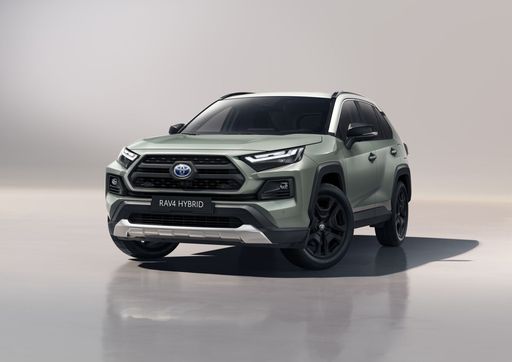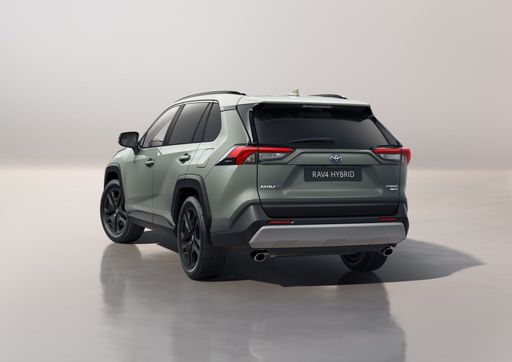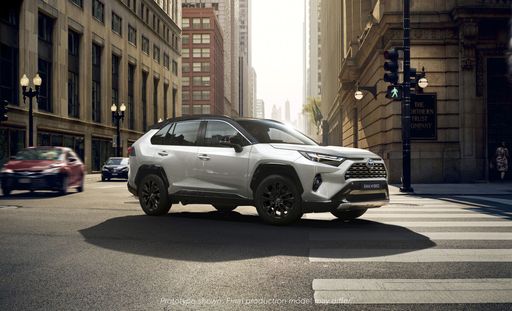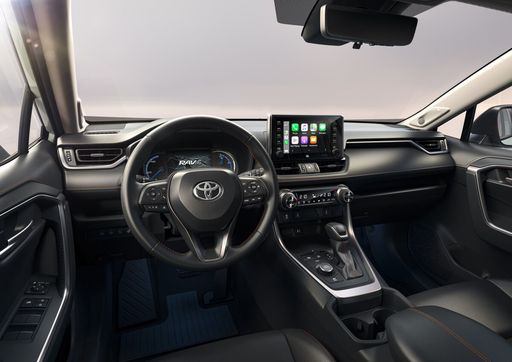Hyundai Tucson VS Toyota RAV4
In the competitive compact SUV segment, the Hyundai Tucson and Toyota RAV4 stand out for their sleek designs and impressive features. The Tucson impresses with its stylish interior and advanced tech options, while the RAV4 is known for its reliability and robust performance in various driving conditions. Ultimately, the choice between these two popular models often comes down to personal preference in design and feature priorities.
Hyundai Tucson
The Hyundai Tucson is a standout choice in the compact SUV segment, offering a perfect blend of style, comfort, and practicality. Its modern design is complemented by a spacious interior that provides ample room for passengers and luggage alike. With advanced technology and safety features, the Tucson ensures a smooth and enjoyable driving experience.
detailsToyota RAV4
The Toyota RAV4 stands out in the crowded SUV market with its distinct design, embodying a blend of robustness and style. Its cabin provides a harmonious fusion of comfort and practicality, offering plenty of space for both passengers and luggage. This vehicle is engineered to deliver a smooth driving experience, whether manoeuvring through city streets or exploring winding country roads.
detailsThe compact SUV segment is heating up, with contenders like the Hyundai Tucson and Toyota RAV4 leading the charge. Both vehicles have consistently received high praise for their design, features, and reliability. But how do they stack up against each other? Let’s dive into a detailed comparison that highlights their technical aspects and innovations.
Design and Dimensions
The Hyundai Tucson measures 4510 mm in length, 1865 mm in width, and 1650 mm in height, while the Toyota RAV4 is slightly larger, with dimensions of 4600 mm in length, 1855 mm in width, and 1685 mm in height. Despite the RAV4’s larger dimensions, both SUVs offer a spacious interior that comfortably seats five passengers.
Engine Options and Performance
Under the hood, the Tucson boasts a variety of engine types, including Diesel MHEV, Petrol MHEV, full hybrids, and plug-in hybrids, with power outputs ranging from 136 to 252 HP. The RAV4, however, specializes in full hybrid and plug-in hybrid powertrains, achieving power ratings of up to 306 HP. The Tucson offers a top speed of up to 194 km/h, which is comparable with the RAV4’s 180 km/h cap.
Fuel Efficiency
When it comes to fuel consumption, the Tucson presents an impressively low figure, reaching as efficient as 5.1 L/100 km for its diesel variant. On the other hand, the RAV4 offers an equally impressive consumption at around 5.6 L/100 km for its hybrid variants, while its plug-in hybrid model can achieve remarkable electric ranges up to 75 km. Meanwhile, the Tucson's electric range is slightly lower at 65-70 km depending on the configuration.
Acceleration and Handling
The Tucson demonstrates competitive performance with acceleration times ranging from 7.9 to 11.6 seconds for the 0-100 km/h sprint across its varied engine offerings. The RAV4 shines in this respect, showcasing swift figures between 6 to 8.4 seconds, making it particularly appealing for those who value quick responsiveness.
Interior Features and Innovations
Both SUVs come equipped with a myriad of modern features. The Hyundai Tucson emphasizes a sleek, tech-forward cabin with advanced infotainment systems, user-friendly interfaces, and practical storage solutions. In contrast, the Toyota RAV4 integrates a more rugged design with a focus on durability and reliability but also includes state-of-the-art technology, with intuitive controls that enhance the driving experience.
Safety Systems
Safety remains a top priority for both models. The Tucson is equipped with a suite of Hyundai SmartSense technologies, featuring adaptive cruise control, lane-keeping assist, and blind-spot monitoring. The RAV4 stands its ground with Toyota Safety Sense, which includes automatic emergency braking, adaptive cruise control, and a pre-collision system designed to mitigate accidents.
Practicality and Cargo Space
Practicality is crucial in the SUV segment, and here the RAV4 slightly edges out with a maximum trunk capacity of 580 L, compared to Tucson's maximum of 620 L across its variants. Both vehicles offer flexible seating configurations and ample cargo space for daily errands or weekend adventures.
Conclusion: Which SUV Reigns Supreme?
In the clash of the compact titans, the Hyundai Tucson and Toyota RAV4 each have their strengths. The Tucson excels in customization options, innovative technology, and fuel efficiency, while the RAV4 shines in performance, safety features, and practicality. Ultimately, the choice depends on individual priorities—whether you prefer Hyundai's modern design or Toyota's reliability and power.
 @ hyundai.news
@ hyundai.news
 @ hyundai.news
@ hyundai.news
 @ hyundai.news
@ hyundai.news
 @ hyundai.news
@ hyundai.news
 @ hyundai.news
@ hyundai.news
 @ Toyota
@ Toyota
 @ Toyota
@ Toyota
 @ Toyota
@ Toyota
 @ Toyota
@ Toyota

|

|
|
|
|
Costs and Consumption |
|
|---|---|
|
Price
about 32300 - 50000
$
|
Price
about 37900 - 54300
$
|
|
Consumption L/100km
1 - 6.8
L
|
Consumption L/100km
1 - 5.6
L
|
|
Consumption kWh/100km
-
|
Consumption kWh/100km
-
|
|
Electric Range
65 - 70
km
|
Electric Range
75
km
|
|
Battery Capacity
-
|
Battery Capacity
-
|
|
co2
22 - 153
g/km
|
co2
22 - 128
g/km
|
|
Fuel tank capacity
42 - 54
L
|
Fuel tank capacity
55
L
|
Dimensions and Body |
|
|
Body Type
SUV
|
Body Type
SUV
|
|
Seats
5
|
Seats
5
|
|
Doors
5
|
Doors
5
|
|
Curb weight
1520 - 1889
kg
|
Curb weight
1745 - 1910
kg
|
|
Trunk capacity
546 - 620
L
|
Trunk capacity
520 - 580
L
|
|
Length
4510 - 4520
mm
|
Length
4600
mm
|
|
Width
1865
mm
|
Width
1855
mm
|
|
Height
1650
mm
|
Height
1685
mm
|
|
Payload
525 - 545
kg
|
Payload
390 - 600
kg
|
Engine and Performance |
|
|
Engine Type
Diesel MHEV, Petrol MHEV, Petrol, Full Hybrid, Plugin Hybrid
|
Engine Type
Full Hybrid, Plugin Hybrid
|
|
Transmission
Automatic, Manuel
|
Transmission
Automatic
|
|
Transmission Detail
Automat. Schaltgetriebe (Doppelkupplung), Manual Gearbox, Automatic Gearbox
|
Transmission Detail
CVT
|
|
Drive Type
Front-Wheel Drive, All-Wheel Drive
|
Drive Type
Front-Wheel Drive, All-Wheel Drive
|
|
Power HP
136 - 252
HP
|
Power HP
218 - 306
HP
|
|
Acceleration 0-100km/h
7.9 - 11.6
s
|
Acceleration 0-100km/h
6 - 8.4
s
|
|
Max Speed
180 - 194
km/h
|
Max Speed
180
km/h
|
|
Torque
265 - 367
Nm
|
Torque
-
|
|
Number of Cylinders
4
|
Number of Cylinders
4
|
|
Power kW
100 - 185
kW
|
Power kW
160 - 225
kW
|
|
Engine capacity
1598
cm3
|
Engine capacity
2487
cm3
|
|
Top speed
180 - 194
km/h
|
Top speed
180
km/h
|
General |
|
|
Model Year
2024
|
Model Year
2020 - 2024
|
|
CO2 Efficiency Class
D, E, B
|
CO2 Efficiency Class
D, B
|
|
Brand
Hyundai
|
Brand
Toyota
|
Hyundai Tucson
Introducing the Hyundai Tucson: An SUV with Innovation at its Core
The Hyundai Tucson has long been synonymous with reliability, comfort, and exceptional value. With its 2024 model, this popular SUV has taken a bold leap forward by incorporating cutting-edge technology, efficient powertrains, and striking design. Let's delve into the technical details and innovations that make the Hyundai Tucson a standout in the crowded SUV market.
Dynamic Engine Options: Power Meets Efficiency
The Tucson offers a range of powertrains, ensuring there is a model perfect for every driver. Whether you're looking for the fuel efficiency of a mild-hybrid diesel or the power of a plug-in hybrid, the Tucson has you covered. The engine options include:
- Diesel Mild-Hybrid: Combining efficiency with robust performance.
- Benzin Mild-Hybrid: Offering a balance between economy and power.
- Voll-Hybrid: Delivering impressive power while maintaining low fuel consumption.
- Plug-in Hybrid: Offering electric-only driving capabilities with a range of up to 65 km.
These engines are paired with either a manual or automatic transmission, catering to different driving preferences.
Performance and Handling: Experience the Drive
The performance of the Hyundai Tucson is designed to impress, with power outputs ranging from 136 to 252 PS. The Tucson accelerates from 0-100 km/h in as little as 8.1 seconds, managed by precise transmission options such as the dual-clutch and traditional automatic gearboxes. With both front-wheel and all-wheel drive options, the Tucson assures stability and control in varied driving conditions.
Interior and Technology: Comfort Meets Cutting-Edge Innovation
The Tucson's interior is a haven of comfort and technology. With a length ranging up to 4520 mm and a spacious boot capacity of 620 litres, practicality is at the forefront. The intuitive infotainment system includes advanced connectivity features, while driver-assist technologies enhance safety and convenience on every journey.
The choice of luxurious trims and finishes, combined with ergonomic design, ensures that every drive is a pleasure, whether you're on a daily commute or an extended adventure.
Environmental Considerations: Efficiency and Sustainability
Hyundai has made notable strides in ensuring that the Tucson is as environmentally friendly as possible. Models with CO2 emissions as low as 27 g/km place it amongst the leaders in its class for eco-friendly driving. The array of hybrid options further complements Hyundai's commitment to sustainability, providing consumers with green alternatives without compromising performance.
Conclusion: The Hyundai Tucson Is More Than Just an SUV
The 2024 Hyundai Tucson is more than just a means of transport—it's a statement of modernity. It reflects Hyundai's dedication to innovation, efficiency, and comfort, all wrapped up in a stylish and versatile SUV. Whether you're tech-savvy, eco-conscious, or performance-oriented, the Tucson proves to be an ideal choice for forward-thinking drivers.
Toyota RAV4
The Toyota RAV4: A Modern Marvel in the SUV Segment
The Toyota RAV4 has long been a staple in the SUV market, renowned for its reliable performance and innovative design. In the latest iterations, Toyota continues to build on this legacy by integrating advanced technology and superior engineering.
Hybrid Excellence: Under the Hood
The latest RAV4 models are equipped with impressive hybrid engines, offering both full-hybrid and plug-in hybrid options. The performance spectrum ranges from 218 to a staggering 306 PS, providing power without compromising efficiency. These engines are paired with a responsive CVT automatic transmission, delivering a smooth driving experience.
The hybrid variants achieve remarkable fuel efficiency, with consumption rates as low as 1.0 to 5.6 litres per 100 kilometres, depending on the model. Additionally, the plug-in hybrid versions boast an impressive electric-only range of up to 75 kilometres.
Performance Meets Practicality
The Toyota RAV4 is not just about power; it also offers practical features that enhance the driving experience. With a top speed of up to 180 km/h and a rapid acceleration capability of 0-100 km/h in just 6 to 8.4 seconds, it combines the thrill of driving with everyday usability.
The spacious interior comfortably seats five, with a generous boot capacity ranging from 520 to 580 litres, making it ideal for family adventures or long road trips.
Innovative Driving Dynamics
One of the RAV4's standout features is its driving dynamics. Available in both front-wheel and all-wheel drive, the all-wheel drive variants, branded as AWD-i, offer enhanced traction and stability, providing peace of mind in various driving conditions.
Furthermore, Toyota has ensured that the RAV4 caters to diverse tastes and preferences, with several trim levels like the Adventure AWD-i, Business Edition, and the sporty GR SPORT AWD-i, offering unique features and styling options.
Eco-Friendly and Cost Effective
Environmental considerations are central to the RAV4 design philosophy. The model range adheres to strict CO2 emission standards, rated between 22 and 128 g/km, placing it in the B to D CO2 efficiency classes.
Moreover, the running costs of the RAV4 reflect its excellent efficiency, with monthly expenses ranging from €1,068 to €1,315, and cost per kilometre between 42.7 and 52.6 cents, making it a sensible choice for eco-conscious drivers.
Conclusion: The RAV4's Unmatched Appeal
Whether you're a city driver or an adventure seeker, the Toyota RAV4 offers a perfect blend of power, efficiency, and practicality. Its state-of-the-art hybrid technology, coupled with its versatile features, truly sets it apart in the competitive SUV market. With the Toyota RAV4, drivers experience the best of both worlds: exceptional performance and eco-friendly innovation.
